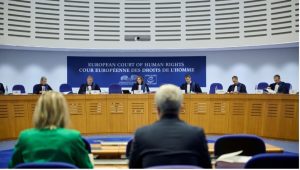By: Rachel Wallisky
Impunity Watch News Staff Writer
STRASBOURG, France – On December 13, 2023, the European Court of Human Rights (ECHR) held a Grand Chamber Hearing in the case of Ukraine v. Russia (re Crimea). However, the Russian Government failed to notify the court of the names of their representatives prior to the hearing, nor did any representatives appear on its behalf. The ECHR elected to continue with the hearing, pursuant to Rules 64 and 65 of the Rules of the Court. The Ukrainian Government is represented by Marharyta Sokorenko, Ben Emmerson, Iyrna Mudra, Andrii Luksha, and Oleksii Yakubenko.
 |
The Complaints
The Hearing relates to three inter-state applications filed by Ukraine in the ECHR over the past decade. Two applications submitted to the Court by Ukraine in 2014 and 2015 were joined in 2018. The ECHR issued a decision establishing its jurisdiction over the application on December 16, 2020.
The Ukrainian Government argues in its application that Russia has exercised “effective control” over Crimea, the City of Sevastopol, and integral parts of Ukraine since February 27, 2014. By doing so, the Ukrainian Government argues that Russia has violated several Articles of the Convention including Article 2 and Article 3, the Right to Life and Prohibition of Inhuman Treatment and Torture, respectively.
Specifically, Ukraine argues that between February 27, 2014 and August 16, 2015, Russia exercised an administrative practice of “enforced disappearances” of “perceived opponents to Russia,” especially Ukrainian soldiers, ethnic Ukrainians, and Tartars, and that Russia failed to engage in any adequate investigation of those disappearances.
The Hearing
The Hearing began with a reading of a summary of the applications being considered and the complaints surrounding them. The President of the ECHR, Síofra O’Leary, noted that Russia ceased to be a party to the ECHR on September 16, 2022. However, because Russia was a member of the Counsel of Europe at the time of the complaints, it cannot escape its obligations under the Convention. President O’Leary noted that though the ECHR had maintained communication with Russia regarding the allegations made against it by Ukraine, Russia has not communicated with the Court since leaving the ECHR.
When addressing the Court, Mr. Emmerson remarked that it was “unprecedented” that a Hearing continued though only one party was present for arguments. Mr. Emmerson argued that Russia’s “enforced disappearance” practices during its occupation of Crimea fell under Article 2 because the failure of the Russian government to acknowledge that a person had been imprisoned or killed increased the likelihood that they would be subject to inhumane treatment, regardless of if the person is later released or their killing acknowledged.
A ruling from the ECHR can be expected “at a later stage” but a recording of the Grand Chamber Hearing is available on the ECHR’s website.
For further information, please see:
ECHR – Grand Chamber Hearing on Inter-State Case Ukraine v. Russia (re Crimea) – 13 Dec. 2023
ECHR – Interim Measure Granted in Inter-State Case Brought by Ukraine Against Russia – 13 March 2014
ECHR – New Inter-State Application Brought by Ukraine Against Russia – 27 August 2018
ECHR – Rules of Court – 30 October 2023